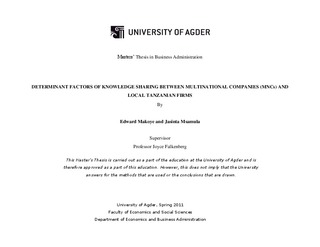| dc.description.abstract | Structural reforms of the late 1990‘s and early 2000‘s changed the condition of the political economy that had been previously dominated by the state to a more liberalized one characterized by privatization of companies and parastatals in Tanzania. The aftermath saw an increased influx of Foreign Direct Investments (FDIs) perpetuated by large Multinational Companies (MNCs) operating at the global scale. These companies are thought to exert an enormous influence in terms of fostering host country development, especially in its economic endeavors. However, much of the benefits to host countries are dependent on the domestic firms‘ ability to acquire and use new knowledge shared from MNCs. This knowledge is said to be embedded in both organizational routines/methods, principles and equipment, and within individual employees. We contribute to the literature by providing empirical evidences of inter-firm knowledge sharing between (MNCs) and host country firms operating in developing countries.
This study assessed two factors namely absorptive capacity and institutional distance as key determinants for acquisition of external knowledge by Tanzanian domestic firms. The theoretical review of this study is grounded mainly onto the Resource-Based View (RBV) of the firm, Knowledge-Based View (KBV) of the firm, and Transaction Cost Analysis (TCA) theory. We employed a descriptive (cross-sectional) design by sampling 80 domestic firms, each of which provided us with one respondent. To analyze the gathered data, we used multiple regression technique with SPSS for windows version 18.0.
Our findings indicate that both factors are good predictors of knowledge sharing between domestic firms and their business partners from developed countries. In other words, this study suggests that given the ability to deal with institutional differences and ensuring for the availability of absorptive capacities by the domestic firms, new external knowledge can easily be tapped and assimilated by domestic firms from MNCs. The two factors indicate about 65% possibility of acquiring knowledge should domestic firms be effective in working for their potential. Other factors such as type of industry, age of the firm and type of business relationships firms forge to be in give no significant contributions to knowledge sharing capacity accounting for only about 5%. However, generalization to all industries is not guaranteed by this study. We anchor on these findings to discuss some implications to Tanzanian managers in particular and national policy-makers in general before we wind up our report by sorting out limitations of the study and suggest for areas worthy undertaking further studies. | en_US |
